254 books about Presidents & Heads of State and 7
start with F
254 books about Presidents & Heads of State and 7
254 books about Presidents & Heads of State
7 start with F start with F
7 start with F start with F

Fidel Castro
Nick Caistor
Reaktion Books, 2013
Fidel Castro had ruled the island of Cuba for fifty-two years when ill health forced him to step down in 2008. Over the course of that time, he changed Cuba from a republic to a communist state and became one of the most divisive leaders in the second half of the twentieth century. For some, he is a champion of humanitarianism, socialism, and environmentalism. For others, he is a monster and dictator who perpetuated human rights abuses at home and abroad.
Providing a rare, evenhanded account of Castro’s life, journalist Nick Caistor brings together interviews with people who have known Castro with discussion of the ideas that drove him. Caistor follows Castro’s life from his birth as the illegitimate son of a wealthy farmer in 1926 to the developing of his leftist, anti-imperialist ideas at the University of Havana and his primary role in the Cuban Revolution in the 1950s. He explores Castro’s economic and military alliance with the Soviet Union and his hostile relationship with the United States while also looking at how he simultaneously introduced free health care and education while squelching freedom of the press and suppressing dissidents. As Caistor shows, Castro’s numerous writings on politics, capitalism, and other topics have influenced leaders from Nelson Mandela to Hugo Chávez, but allegations of corruption, human rights abuses, and dictatorship never ceased during his long career.
[more]
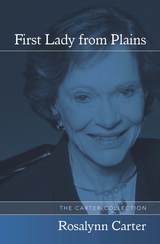
First Lady from Plains
Rosalynn Carter
University of Arkansas Press, 1994
First Lady from Plains, first published in 1984, is Rosalynn’s Carter’s autobiography, covering her life from her childhood in Plains, Georgia, through her time as First Lady. It is “a readable, lively and revealing account of the Carters and their remarkable journey from rural Georgia to the White House in a span of ten years” (The New York Times).
[more]
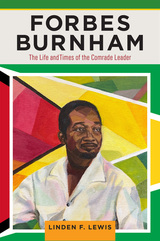
Forbes Burnham
The Life and Times of the Comrade Leader
Linden F. Lewis
Rutgers University Press, 2024
It is virtually impossible to understand the history of modern Guyana without understanding the role played by Forbes Burnham. As premier of British Guiana, he led the country to independence in 1966 and spent two decades as its head of state until his death in 1985. An intensely charismatic politician, Burnham helped steer a new course for the former colony, but he was also a quintessential strongman leader, venerated by some of his citizens yet feared and despised by others.
Forbes Burnham: The Life and Times of the Comrade Leader is the first political biography of this complex and influential figure. It charts how the political party he founded, the People’s National Congress, combined nationalist rhetoric, socialist policies, and Pan-Africanist philosophies. It also explores how, in a country already deeply divided between the descendants of African slaves and Indian indentured servants, Burnham consolidated political power by intensifying ethnic polarizations. Drawing from historical archives as well as new interviews with the people who knew Burnham best, sociologist Linden F. Lewis examines how his dictatorial tendencies coexisted with his progressive convictions. Forbes Burnham is a compelling study of the nature of postcolonial leadership and its pitfalls.
Forbes Burnham: The Life and Times of the Comrade Leader is the first political biography of this complex and influential figure. It charts how the political party he founded, the People’s National Congress, combined nationalist rhetoric, socialist policies, and Pan-Africanist philosophies. It also explores how, in a country already deeply divided between the descendants of African slaves and Indian indentured servants, Burnham consolidated political power by intensifying ethnic polarizations. Drawing from historical archives as well as new interviews with the people who knew Burnham best, sociologist Linden F. Lewis examines how his dictatorial tendencies coexisted with his progressive convictions. Forbes Burnham is a compelling study of the nature of postcolonial leadership and its pitfalls.
[more]
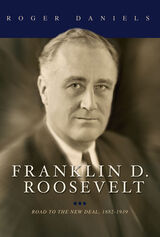
Franklin D. Roosevelt
Road to the New Deal, 1882-1939
Roger Daniels
University of Illinois Press, 2015
Franklin D. Roosevelt, consensus choice as one of three great presidents, led the American people through the two major crises of modern times. This volume analyses that leadership in combating the Great Depression; its successor explains how he became the leader of the Free World as well. The first volume of an epic two-part biography, Franklin D. Roosevelt: Road to the New Deal, 1882-1939 presents FDR from a privileged Hyde Park childhood through his Depression-era presidency to the ominous buildup to global war. Roger Daniels revisits the sources and closely examines Roosevelt's own words and deeds to create a twenty-first century analysis of how Roosevelt forged the modern presidency. Daniels's close analysis yields new insights into the expansion of Roosevelt's economic views; FDR's steady mastery of the complexities of federal administrative practices and possibilities; the ways the press and presidential handlers treated questions surrounding his health; and his genius for channeling the lessons learned from an unprecedented collection of scholars and experts into bold political action.
[more]
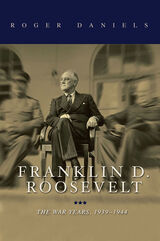
Franklin D. Roosevelt
The War Years, 1939-1945
Roger Daniels
University of Illinois Press, 2016
Having guided the nation through the worst economic crisis in its history, Franklin Delano Roosevelt by 1939 was turning his attention to a world on the brink of war. The second part of Roger Daniels's biography focuses on FDR's growing mastery in foreign affairs. Relying on FDR's own words to the American people and eyewitness accounts of the man and his accomplishments, Daniels reveals a chief executive orchestrating an immense wartime effort. Roosevelt had effective command of military and diplomatic information and unprecedented power over strategic military and diplomatic affairs. He simultaneously created an arsenal of democracy that armed the Allies while inventing the United Nations intended to ensure a lasting postwar peace. FDR achieved these aims while expanding general prosperity, limiting inflation, and continuing liberal reform despite an increasingly conservative and often hostile Congress. Although fate robbed him of the chance to see the victory he had never doubted, events in 1944 assured him that the victory he had done so much to bring about would not be long delayed. A compelling reconsideration of Roosevelt the president and campaigner, The War Years, 1939-1945 provides new views and vivid insights about a towering figure--and six years that changed the world.
[more]
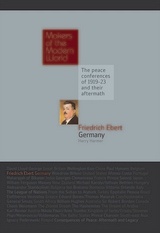
Friedrich Ebert
Germany
Harry Harmer
Haus Publishing, 2009
On 9 November 1918 Ebert became Imperial Chancellor as revolution broke out in Berlin. He opposed the radical left, declaring, 'Without democracy there is no freedom. Violence, no matter who is using it, is always reactionary', but he compromised Weimar democracy by his dependence on the army command and his use of the para-military Freikorps against the left. Ebert headed a joint SPD-USPD government until elections were held to a National Constituent Assembly in January 1919. Ebert became president of the new Weimar Republic (Germany's first democratically elected head of state) and retained office in a turbulent period in German politics. There were arguments among the Allies over how Germany should be treated, as France, Britain and the United States prioritised different objectives. In May 1919, the terms of the Treaty - on reparations, war guilt clause, loss of territories in Europe and colonies, limitations on armed forces - were presented to German representatives, precipitating opposition in government and the Armed Forces, and heated discussion in Cabinet. He continued as President until 1925, forced to confront the issues that arose from the Treaty and its political and economic consequences. After his death came the unravelling of the Treaty and the book examines how much of a part it played in creating the circumstances of the Second World War.
[more]
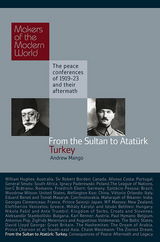
From the Sultan to Atatürk
Turkey
Andrew Mango
Haus Publishing, 2009
World War I sounded the death knell of empires. The forces of disintegration affected several empires simultaneously. To that extent they were impersonal. But prudent statesmen could delay the death of empires, rulers such as Emperor Franz Josef II of Austria-Hungary and the Ottoman Sultan Abdü'lhamid II. Adventurous rulers - Kaiser Wilhelm of Germany and Enver Pasha in the Ottoman Empire - hastened it. Enver's decision to enter the war on the side of Germany destroyed the Ottoman state. It may have been doomed in any case, but he was the agent of its doom. The last Sultan Mehmet VI Vahdettin thought he could salvage the Ottoman state in something like its old form. But Vahdettin and his ministers could not succeed because the victorious Allies had decided on the final partition of the Ottoman state. The chief proponent of partition was Lloyd George, heir to the Turcophobe tradition of British liberals, who fell under the spell of the Greek irredentist politician Venizelos. With these two in the lead, the Allies sought to impose partition on the Sultan's state. When the Sultan sent his emissaries to the Paris peace conference they could not win a reprieve. The Treaty of Sèvres which the Sultan's government signed put an end to Ottoman independence. The Treaty of Sèvres was not ratified. Turkish nationalists, with military officers in the lead, defied the Allies, who promptly broke ranks, each one trying to win concessions for himself at the expense of the others. Mustafa Kemal emerged as the leader of the military resistance. Diplomacy allowed Mustafa Kemal to isolate his people's enemies: Greek and Armenian irredentists. Having done so, he defeated them by force of arms. In effect, the defeat of the Ottoman empire in the First World War was followed by the Turks' victory in two separate wars: a brief military campaign against the Armenians and a long one against the Greeks. Lausanne—where General Ismet succeeded in securing peace on Turkey's terms—was the founding charter of the modern Turkish nation state. But more than that it showed that empires could no longer rule peoples against their wishes. This need not be disastrous: Mustafa Kemal demonstrated that the interests of developed countries were compatible with those of developing ones. He fought the West in order to become like it. Where his domestic critics wanted to go on defying the West, Mustafa Kemal saw that his country could fare best in cooperation with the West.
[more]
READERS
Browse our collection.
PUBLISHERS
See BiblioVault's publisher services.
STUDENT SERVICES
Files for college accessibility offices.
UChicago Accessibility Resources
home | accessibility | search | about | contact us
BiblioVault ® 2001 - 2024
The University of Chicago Press









